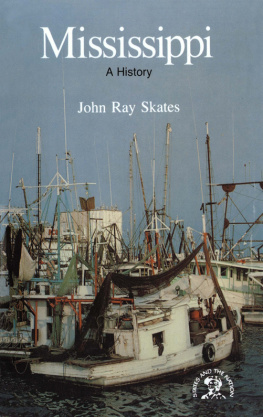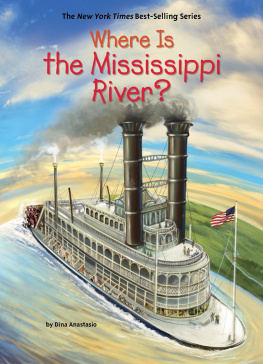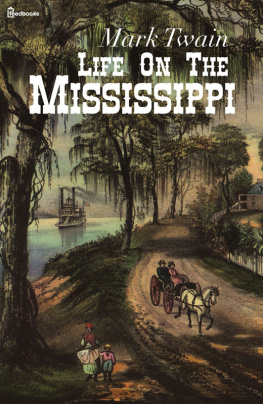Mark Tven - Life on the Mississippi
Here you can read online Mark Tven - Life on the Mississippi full text of the book (entire story) in english for free. Download pdf and epub, get meaning, cover and reviews about this ebook. year: 1883, genre: Prose. Description of the work, (preface) as well as reviews are available. Best literature library LitArk.com created for fans of good reading and offers a wide selection of genres:
Romance novel
Science fiction
Adventure
Detective
Science
History
Home and family
Prose
Art
Politics
Computer
Non-fiction
Religion
Business
Children
Humor
Choose a favorite category and find really read worthwhile books. Enjoy immersion in the world of imagination, feel the emotions of the characters or learn something new for yourself, make an fascinating discovery.

Life on the Mississippi: summary, description and annotation
We offer to read an annotation, description, summary or preface (depends on what the author of the book "Life on the Mississippi" wrote himself). If you haven't found the necessary information about the book — write in the comments, we will try to find it.
Life on the Mississippi — read online for free the complete book (whole text) full work
Below is the text of the book, divided by pages. System saving the place of the last page read, allows you to conveniently read the book "Life on the Mississippi" online for free, without having to search again every time where you left off. Put a bookmark, and you can go to the page where you finished reading at any time.
Font size:
Interval:
Bookmark:
Mark Twain
Life on the Mississippi
THE 'BODY OF THE NATION'
BUT the basin of the Mississippi is the BODY OF THE NATION. All the other parts are but members, important in themselves, yet more important in their relations to this. Exclusive of the Lake basin and of 300,000 square miles in Texas and New Mexico, which in many aspects form a part of it, this basin contains about 1,250,000 square miles. In extent it is the second great valley of the world, being exceeded only by that of the
Amazon. The valley of the frozen Obi approaches it in extent; that of
La Plata comes next in space, and probably in habitable capacity, having about eight-ninths of its area; then comes that of the Yenisei, with about seven-ninths; the Lena, Amoor, Hoang-ho, Yang-tse-kiang, and
Nile, five-ninths; the Ganges, less than one-half; the Indus, less than one-third; the Euphrates, one-fifth; the Rhine, one-fifteenth. It exceeds in extent the whole of Europe, exclusive of Russia, Norway, and Sweden. IT WOULD CONTAIN AUSTRIA FOUR TIMES, GERMANY OR SPAIN
FIVE TIMES, FRANCE SIX TIMES, THE BRITISH ISLANDS OR ITALY TEN TIMES.
Conceptions formed from the river-basins of Western Europe are rudely shocked when we consider the extent of the valley of the Mississippi; nor are those formed from the sterile basins of the great rivers of
Siberia, the lofty plateaus of Central Asia, or the mighty sweep of the swampy Amazon more adequate. Latitude, elevation, and rainfall all combine to render every part of the Mississippi Valley capable of supporting a dense population. AS A DWELLING-PLACE FOR CIVILIZED MAN IT IS BY FAR THE FIRST UPON OUR GLOBE.
EDITOR'S TABLE, HARPER'S MAGAZINE, FEBRUARY 1863
Chapter 1 The River and Its History
THE Mississippi is well worth reading about. It is not a commonplace river, but on the contrary is in all ways remarkable. Considering the
Missouri its main branch, it is the longest river in the world-four thousand three hundred miles. It seems safe to say that it is also the crookedest river in the world, since in one part of its journey it uses up one thousand three hundred miles to cover the same ground that the crow would fly over in six hundred and seventy-five. It discharges three times as much water as the St. Lawrence, twenty-five times as much as the Rhine, and three hundred and thirty-eight times as much as the
Thames. No other river has so vast a drainage-basin: it draws its water supply from twenty-eight States and Territories; from Delaware, on the
Atlantic seaboard, and from all the country between that and Idaho on the Pacific slope-a spread of forty-five degrees of longitude. The
Mississippi receives and carries to the Gulf water from fifty-four subordinate rivers that are navigable by steamboats, and from some hundreds that are navigable by flats and keels. The area of its drainage-basin is as great as the combined areas of England, Wales, Scotland, Ireland, France, Spain, Portugal, Germany, Austria, Italy, and Turkey; and almost all this wide region is fertile; the Mississippi valley, proper, is exceptionally so.
It is a remarkable river in this: that instead of widening toward its mouth, it grows narrower; grows narrower and deeper. From the junction of the Ohio to a point half way down to the sea, the width averages a mile in high water: thence to the sea the width steadily diminishes, until, at the 'Passes,' above the mouth, it is but little over half a mile. At the junction of the Ohio the Mississippi's depth is eighty-seven feet; the depth increases gradually, reaching one hundred and twenty-nine just above the mouth.
The difference in rise and fall is also remarkable-not in the upper, but in the lower river. The rise is tolerably uniform down to Natchez (three hundred and sixty miles above the mouth)-about fifty feet.
But at Bayou La Fourche the river rises only twenty-four feet; at New
Orleans only fifteen, and just above the mouth only two and one half.
An article in the New Orleans 'Times-Democrat,' based upon reports of able engineers, states that the river annually empties four hundred and six million tons of mud into the Gulf of Mexico-which brings to mind
Captain Marryat's rude name for the Mississippi-'the Great Sewer.' This mud, solidified, would make a mass a mile square and two hundred and forty-one feet high.
The mud deposit gradually extends the land-but only gradually; it has extended it not quite a third of a mile in the two hundred years which have elapsed since the river took its place in history. The belief of the scientific people is, that the mouth used to be at Baton Rouge, where the hills cease, and that the two hundred miles of land between there and the Gulf was built by the river. This gives us the age of that piece of country, without any trouble at all-one hundred and twenty thousand years. Yet it is much the youthfullest batch of country that lies around there anywhere.
The Mississippi is remarkable in still another way-its disposition to make prodigious jumps by cutting through narrow necks of land, and thus straightening and shortening itself. More than once it has shortened itself thirty miles at a single jump! These cut-offs have had curious effects: they have thrown several river towns out into the rural districts, and built up sand bars and forests in front of them. The town of Delta used to be three miles below Vicksburg: a recent cutoff has radically changed the position, and Delta is now TWO MILES ABOVE
Vicksburg.
Both of these river towns have been retired to the country by that cut-off. A cut-off plays havoc with boundary lines and jurisdictions: for instance, a man is living in the State of Mississippi to-day, a cut-off occurs to-night, and to-morrow the man finds himself and his land over on the other side of the river, within the boundaries and subject to the laws of the State of Louisiana! Such a thing, happening in the upper river in the old times, could have transferred a slave from
Missouri to Illinois and made a free man of him.
The Mississippi does not alter its locality by cut-offs alone: it is always changing its habitat BODILY-is always moving bodily SIDEWISE.
At Hard Times, La., the river is two miles west of the region it used to occupy. As a result, the original SITE of that settlement is not now in
Louisiana at all, but on the other side of the river, in the State of
Mississippi. NEARLY THE WHOLE OF THAT ONE THOUSAND THREE HUNDRED MILES
OF OLD MISSISSIPPI RIVER WHICH LA SALLE FLOATED DOWN IN HIS CANOES, TWO
HUNDRED YEARS AGO, IS GOOD SOLID DRY GROUND NOW. The river lies to the right of it, in places, and to the left of it in other places.
Although the Mississippi's mud builds land but slowly, down at the mouth, where the Gulfs billows interfere with its work, it builds fast enough in better protected regions higher up: for instance, Prophet's
Island contained one thousand five hundred acres of land thirty years ago; since then the river has added seven hundred acres to it.
But enough of these examples of the mighty stream's eccentricities for the present-I will give a few more of them further along in the book.
Let us drop the Mississippi's physical history, and say a word about its historical history-so to speak. We can glance briefly at its slumbrous
Chapter 2 The River and Its Explorers
LA SALLE himself sued for certain high privileges, and they were graciously accorded him by Louis XIV of inflated memory. Chief among them was the privilege to explore, far and wide, and build forts, and stake out continents, and hand the same over to the king, and pay the expenses himself; receiving, in return, some little advantages of one sort or another; among them the monopoly of buffalo hides. He spent several years and about all of his money, in making perilous and painful trips between Montreal and a fort which he had built on the Illinois, before he at last succeeded in getting his expedition in such a shape that he could strike for the Mississippi.
Font size:
Interval:
Bookmark:
Similar books «Life on the Mississippi»
Look at similar books to Life on the Mississippi. We have selected literature similar in name and meaning in the hope of providing readers with more options to find new, interesting, not yet read works.
Discussion, reviews of the book Life on the Mississippi and just readers' own opinions. Leave your comments, write what you think about the work, its meaning or the main characters. Specify what exactly you liked and what you didn't like, and why you think so.










